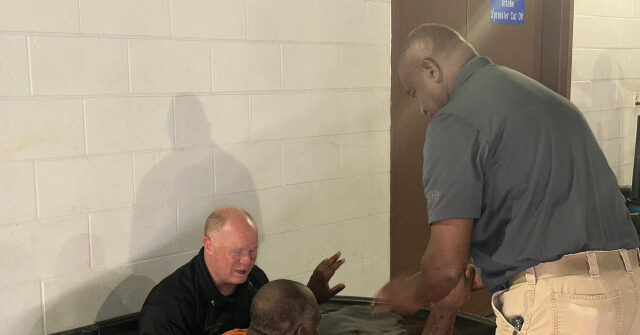After 80 years, they received the dignified burials they were denied in the final days of World War II, when their bodies were tipped into a mass grave.
The remains of the 42 people found outside a now-abandoned ethnic Polish village in western Ukraine were reburied Saturday in individual caskets, each topped with blue wildflowers — this time with a priest intoning prayers and Polish government officials in attendance.
For their descendants, the ceremony brought closure to family history. For Ukraine, it was intended to put to rest a long-festering dispute with Poland, a critical ally in the war with Russia, over history and World War II-era massacres.
After the Soviet breakup, Poland accused Ukraine of sweeping a record of war crimes by the Ukrainian underground of the mid-20th century under the rug. In Ukraine, members of the Ukrainian nationalist movement have been to elevate to the status of heroes who paved the way for the country’s eventual independence in 1991.
Ukraine and Poland argued for the past decade over exhuming mass graves in western Poland. But Ukraine, now desperate for Western military aid that flows through Poland, agreed last year to allow the effort to go forward. Another site was exhumed last week. A dozen others are planned.
“The only country that will be happy with tensions between Ukraine and Poland is Russia,” Andriy Nadzhos, a deputy Ukrainian Minister of Culture, said in an interview. “We don’t want to give Russia this gift.”
Under the new policy on the mass graves, those in Ukraine believed to hold ethnic Poles will be exhumed. The remains will be sent to Poland for identification, if possible, and then returned to Ukraine for reburial near the now deserted or Ukrainian-inhabited former Polish villages.
On Saturday, the fresh graves were cut in an otherwise overgrown and long-abandoned cemetery near the abandoned, formerly ethnic Polish village of Puzhnyky, in the Ternopil region of western Ukraine.
Descendants of the Poles killed at the site decades earlier stood in black attire. Priests from the Roman Catholic, Greek Catholic and Ukrainian Orthodox churches performed a joint funeral mass. The speaker of the Polish senate, Małgorzata Kidawa-Błońska, and the minister of culture, Marta Cienkowska, attended.
Below the bucolic landscape of forests, fields and hills in western Ukraine lie scores of mass graves, and a tangled history of collusion and murder in the waning days of World War II. Disputes over this history have flared for years between Ukraine and several of its western neighbors including Poland.
The historical disputes center on a time near the end of World War II, in 1944 and 1945, when the Nazi army was in retreat across western Ukraine. Both Polish and Ukrainian underground movements — the Polish Home Army, or Armia Krajowa, and the Ukrainian Partisan Army — were active then. Both wanted to carve out independent countries after the war.
The Ukrainian underground at times allied with the retreating Nazi army, though branches of the Ukrainian movement had earlier in the war fought the Nazis. The Poles allied at times with the Soviet army, which had turned to ethnic Polish units for help rooting out the Ukrainian underground.
Ukraine calls this brief but bloody conflict the Polish and Ukrainian War. Poland calls it the Volyn Massacre, after Ukrainian massacres of ethnic Poles in villages in the Volyn region and elsewhere. Historians estimate that tens of thousands of Polish civilians were killed.
In Puzhnyky, apart from a few mossy headstones in the cemetery, the only reminders of the former village are fruit trees growing in the woods, from former gardens.
Ukrainian historians say this village in early 1945 was a hub for a branch of the Polish underground collaborating with the Soviet secret police, called the N.K.V.D. at the time, which was hunting Ukrainian pro-independence partisans. The Ukrainian Partisan Army attacked the village on Feb. 13, 1945.
Polish historians have characterized what happened as a massacre of villagers. In the exhumation, evidence of both interpretations emerged. The grave held remains of adult men, adult women and 10 children, along with buttons and medals from military uniforms.
After World War II, the Soviet Union settled the conflict in western Ukraine by expelling ethnic Poles from Ukraine and ethnic Ukrainians from Poland, leaving Puzhnyky abandoned.
This historical period is a live wire in the politics of both countries, even as they are allies in Ukraine’s war with Russia.
Ukraine halted exhumations in 2015, accusing Poland of failing to protect Ukrainian graves in Poland from vandalism. Grievances about mass graves of Poles in Ukraine are a staple of Polish nationalist politics, endangering aid to Ukraine.
“For Ukraine, it’s critically important” to avoid conflict with Poland during the war with Russia, said Mr. Nadzhos, the Ukrainian cultural official. “We believe this is an important first step in the right direction.”
Andrew E. Kramer is the Kyiv bureau chief for The Times, who has been covering the war in Ukraine since 2014.
The post A World War II Dispute Between Ukraine and Poland Is Put to Rest appeared first on New York Times.




